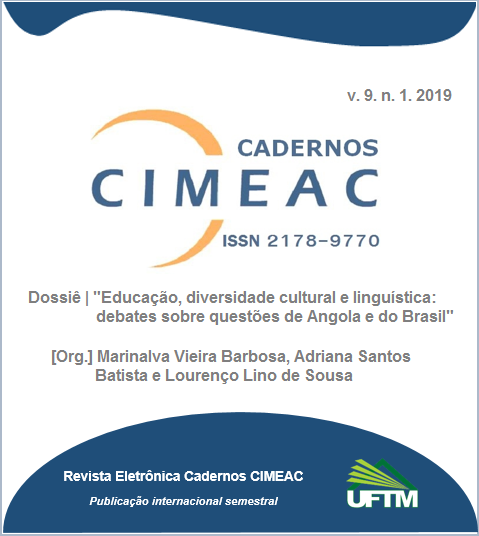Ditos e não ditos sobre o perfil do professor angolano em textos jornalísticos / Said and unsaid about the profile of the Angolan teacher in journalist texts
DOI:
https://doi.org/10.18554/cimeac.v9i1.3864Resumo
Neste artigo, é apresentada uma análise de discurso jornalístico acerca das representações sobre o perfil de professor na educação angolana. O objetivo é discutir, linguística e discursivamente, como os meios de comunicação abordam aspectos ligados à educação, com foco na análise dos ditos e não ditos em concurso público para professor de rede pública em Angola, no ano de 2018. Para tanto, foram utilizadas as contribuições teórico-metodológicas de Pêcheux (1988) sobre o interdiscurso e Orlandi (1997) a respeito do silêncio, importantes para o entendimento do “jogo discursivo” entre o dito e não dito sobre o perfil do professor. Para a composição do corpus, foram considerados 14 textos publicados em 2018 no Jornal de Angola. Tal recorte temporal foi estabelecido por coincidir com a realização do concurso público que foi amplamente abordado pela mídia, constituindo a nossa hipótese de que os aspectos abordados pelos meios de comunicação são aqueles para os quais se busca adesão por parte dos governantes. Dessa forma, haveria material para discutir como e quais anseios do setor educacional sobre o futuro professor são representados pela mídia. Cabe ressaltar que as análises da interconexão entre diferentes tipos de discursos poderão possibilitar uma maior compreensão de seu impacto no imaginário que se constrói acerca dos professores, do ensino em geral e da solução para as dificuldades educacionais em Angola.
Palavras-chave: Concurso público; Discurso; Educação; Formações imaginárias.
ABSTRACT: In this article, we present an analysis of journalistic discourse about the representations of the teacher profile in Angolan education. The objective is to discuss, linguistically and discursively, how the media approach aspects related to education, focusing on the analysis of what has been said and not said in a public tender for new teachers in the public sector in Angola, in the year 2018. In this manner, were used the theoretical-methodological contributions of Pêcheux (1988) on interdiscourse and Orlandi (1997) on silence, important for the understanding of the "discursive game" between the said and not said about the profile of the teacher. In order to compose the corpus, we considered 14 texts published in 2018 by the Jornal de Angola. Such a temporal definition was established because of its coinciding with the public tender that was widely covered by the media, so our hypothesis is that the aspects addressed by the media are those for which acceptance is sought by the government. In this way, there would be material to discuss how and which educational sector expectations of the future teacher are represented by the media. It should be emphasized that the analysis of the interconnection between different types of discourses may allow a better understanding of its impact on the imaginary that is built on teachers, teaching in general and the solution to the educational difficulties in Angola.
Keywords: Civil service examination; Discourse; Education; Imaginary formations.
Downloads
Publicado
Edição
Seção
Licença
Os autores que publicam nesta revista concordam com os seguintes termos:
(a) Não cobramos dos autores para a publicação neste periódico.
(b) Autores mantém os direitos autorais e concedem à revista o direito de primeira publicação, com o trabalho simultaneamente licenciado sob a Licença Creative Commons que permite o compartilhamento do trabalho com reconhecimento da autoria e publicação inicial nesta revista.
(c) Autores têm permissão e são estimulados a difundir e a distribuir a versão publicada de seu trabalho online (ex.: em repositórios institucionais ou na sua página pessoal) após o processo editorial, já que isso pode aumentar o impacto e a citação do trabalho publicado (Veja O Efeito do Acesso Livre).
* * *
AUTHORS COPYRIGHT AND PUBLISHING RIGHTS
Authors who publish with this journal agree to the following terms:
(a) This journal does not charge authors for publication.
(b) Authors retain copyright and grant the journal right of first publication with the work simultaneously licensed under a Creative Commons Attribution License that allows others to share the work with an acknowledgement of the work's authorship and initial publication in this journal.
(c) For authors whose articles have been accepted: authors are permitted and encouraged to post their work online (e.g., in institutional repositories or on their website) after the publication of the text in Cadernos CIMEAC, as it can lead to productive exchanges as well as earlier and greater citation of published work (See The Effect of Open Access).


 10.18554/cimeac
10.18554/cimeac


